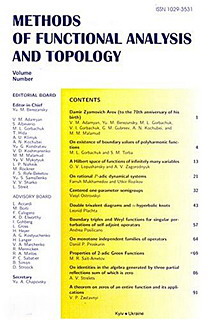Scale-invariant self-adjoint extensions of scale-invariant symmetric operators: continuous versus discrete
Abstract
We continue our study of a $q$-difference version of a second-order differential operator which depends on a real parameter. This version was introduced in our previous three articles on the subject. First we study general symmetric and scale-invariant operators on a Hilbert space. We show that if the index of defect of the operator under consideration is $(1,1)$, then the operator either does not admit any scale-invariant self-adjoint extension, or it admits exactly one scale-invariant self-adjoint extension, or it admits exactly two scale-invariant self-adjoint extensions, or all self-adjoint extensions are scale invariant. We then apply these results to the differential operator and the corresponding difference operator under consideration. For the continuous case, we show that the interval of the parameter, for which the differential operator is not semi-bounded, contains an infinite sequence of values for which all self-adjoint extensions are scale-invariant, while for the remaining values of the parameter from that interval, there are no scale-invariant self-adjoint extensions. For the corresponding difference operator, we show that if it is not semi-bounded, then it does not admit any scale-invariant self-adjoint extension. We also show that both differential and difference operators, at value(s) of the parameter that cor espond to the endpoint(s) of the interval(s) of semi-boundedness, have exactly one scale-invariant self-adjoint extension.
Key words: q-difference operator, self-adjoint, scale-invariant, discrete spectrum, simple spectrum.

